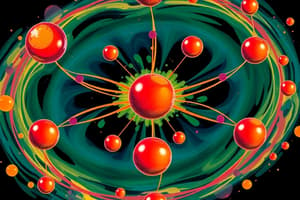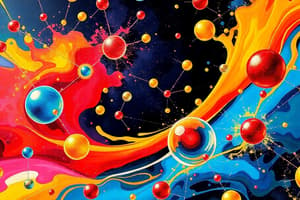Podcast
Questions and Answers
What distinguishes the state of a solid from a liquid?
What distinguishes the state of a solid from a liquid?
- A solid can be compressed significantly.
- A solid has no definite shape.
- A solid cannot fill a container.
- A solid has a definite volume and shape. (correct)
Which statement about gases is correct?
Which statement about gases is correct?
- Gases fill the entire volume of their container. (correct)
- Gases have a definite volume but no fixed shape.
- Gases tend to have stronger interparticle attractions than liquids.
- Gases can be compressed to occupy a larger volume.
How does the kinetic energy of particles in a gas compare to that in a solid?
How does the kinetic energy of particles in a gas compare to that in a solid?
- Particles in a gas have lower kinetic energy than those in a solid.
- Particles in a gas have higher kinetic energy than those in a solid. (correct)
- Kinetic energy is irrelevant to the states of matter.
- Particles in a gas have the same kinetic energy as those in a solid.
Which of the following best describes plasma?
Which of the following best describes plasma?
Why do liquids have a distinct volume?
Why do liquids have a distinct volume?
What factor primarily affects the state of matter of a substance?
What factor primarily affects the state of matter of a substance?
Which state of matter is characterized by particles that are widely spaced and have minimal attraction to each other?
Which state of matter is characterized by particles that are widely spaced and have minimal attraction to each other?
In what way does a liquid differ from a gas regarding compressibility?
In what way does a liquid differ from a gas regarding compressibility?
What typically causes Permanent Dipole-Permanent Dipole interactions?
What typically causes Permanent Dipole-Permanent Dipole interactions?
Which pair of substances is influenced by Permanent Dipole-Permanent Dipole interactions?
Which pair of substances is influenced by Permanent Dipole-Permanent Dipole interactions?
How does a polar molecule induce a dipole moment in a nonpolar molecule?
How does a polar molecule induce a dipole moment in a nonpolar molecule?
Which of the following types of intermolecular forces is stronger than dipole-induced dipole interactions?
Which of the following types of intermolecular forces is stronger than dipole-induced dipole interactions?
What is the characteristic of Induced Dipole - Induced Dipole (Dispersion Forces)?
What is the characteristic of Induced Dipole - Induced Dipole (Dispersion Forces)?
Which of the following statements about dipole-dipole interactions is true?
Which of the following statements about dipole-dipole interactions is true?
Which interaction is characterized by very weak forces and present in all types of molecules in condensed phases?
Which interaction is characterized by very weak forces and present in all types of molecules in condensed phases?
What is the average energy associated with a dipole-dipole interaction per mole of bonds?
What is the average energy associated with a dipole-dipole interaction per mole of bonds?
What primarily accounts for the high melting and boiling points of water compared to similar compounds?
What primarily accounts for the high melting and boiling points of water compared to similar compounds?
In the dissolution process, what is a characteristic of a solution?
In the dissolution process, what is a characteristic of a solution?
Which type of intermolecular forces are present in water?
Which type of intermolecular forces are present in water?
What are the components of a solution?
What are the components of a solution?
What happens to solids like sodium chloride when water evaporates from their solution?
What happens to solids like sodium chloride when water evaporates from their solution?
Which factor does NOT influence the ease of dissolution of a solute?
Which factor does NOT influence the ease of dissolution of a solute?
In the case of nitrogen dioxide (NO2), what type of intermolecular forces are expected?
In the case of nitrogen dioxide (NO2), what type of intermolecular forces are expected?
What defines the solvent in a solution?
What defines the solvent in a solution?
What is the primary reason that an exothermic dissolution process is favored?
What is the primary reason that an exothermic dissolution process is favored?
Which of the following statements is true regarding weak attractions in the dissolution process?
Which of the following statements is true regarding weak attractions in the dissolution process?
What does the heat of solution, ΔHsolution, primarily depend on?
What does the heat of solution, ΔHsolution, primarily depend on?
Which step in the dissolution process is considered endothermic?
Which step in the dissolution process is considered endothermic?
For a dissolution process to be considered exothermic overall, what must occur?
For a dissolution process to be considered exothermic overall, what must occur?
How does dissolution contribute to disorder in a solution?
How does dissolution contribute to disorder in a solution?
In which of the following scenarios can a solid dissolve in a liquid despite an endothermic process?
In which of the following scenarios can a solid dissolve in a liquid despite an endothermic process?
What role does entropy play in the dissolution process of solids in liquids?
What role does entropy play in the dissolution process of solids in liquids?
What is the main reason that naphthalene does not dissolve in water?
What is the main reason that naphthalene does not dissolve in water?
Which factor increases the magnitude of lattice energy in ionic compounds?
Which factor increases the magnitude of lattice energy in ionic compounds?
What type of process is the dissolution of most ionic solids that release heat?
What type of process is the dissolution of most ionic solids that release heat?
Which of the following statements is true regarding gases dissolving in liquids?
Which of the following statements is true regarding gases dissolving in liquids?
What is the term for the dissolution process when considering liquids mixing with liquids?
What is the term for the dissolution process when considering liquids mixing with liquids?
How does the charge-to-size ratio affect the solubility of ionic solids?
How does the charge-to-size ratio affect the solubility of ionic solids?
What is the dissolution behavior of ammonium nitrate, NH4NO3?
What is the dissolution behavior of ammonium nitrate, NH4NO3?
Why does carbon dioxide seem to have higher solubility in water compared to other nonpolar gases?
Why does carbon dioxide seem to have higher solubility in water compared to other nonpolar gases?
Flashcards
Solid
Solid
A state of matter with a fixed volume and shape due to strong interparticle attractions, causing particles to be tightly packed and vibrate in fixed positions.
Liquid
Liquid
A state of matter with a fixed volume but takes the shape of its container due to weaker interparticle attractions compared to solids. Particles can move more freely but remain in contact.
Gas
Gas
A state of matter with no fixed volume or shape, particles are far apart and have weak attractions. They move freely and rapidly in all directions.
Plasma
Plasma
Signup and view all the flashcards
Kinetic Energy
Kinetic Energy
Signup and view all the flashcards
Intermolecular Forces
Intermolecular Forces
Signup and view all the flashcards
Dipole-Dipole Interactions
Dipole-Dipole Interactions
Signup and view all the flashcards
Dipole-Induced Dipole Interactions
Dipole-Induced Dipole Interactions
Signup and view all the flashcards
London Dispersion Forces
London Dispersion Forces
Signup and view all the flashcards
Hydrogen Bonding
Hydrogen Bonding
Signup and view all the flashcards
Dissolution
Dissolution
Signup and view all the flashcards
Solvent
Solvent
Signup and view all the flashcards
Solute
Solute
Signup and view all the flashcards
Solution
Solution
Signup and view all the flashcards
Heat of Solution, ΔHsolution
Heat of Solution, ΔHsolution
Signup and view all the flashcards
Solute-Solute Attractions
Solute-Solute Attractions
Signup and view all the flashcards
Solvent-Solvent Attractions
Solvent-Solvent Attractions
Signup and view all the flashcards
Solute-Solvent Attractions
Solute-Solvent Attractions
Signup and view all the flashcards
Solubility
Solubility
Signup and view all the flashcards
Lattice Energy
Lattice Energy
Signup and view all the flashcards
Hydration Energy
Hydration Energy
Signup and view all the flashcards
Miscibility
Miscibility
Signup and view all the flashcards
Charge-to-Size Ratio
Charge-to-Size Ratio
Signup and view all the flashcards
Entropy
Entropy
Signup and view all the flashcards




